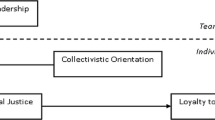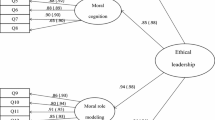Abstract
The aim of this paper is to explore the role of ethical climate on the relationship between the paternalistic leadership and team identification at the team level. In contrast to the prior studies which tended to focus on ethical climate as a whole dimension, this paper further classified the domain of construct into the categories of egoism, benevolence, and principle using a sample from 143 teams in Mainland China and Taiwan. Hierarchical regression results showed that the average paternalistic leadership had a significant impact on the team identification at the team level. Moreover, the results indicated that the ethical climate of benevolence fully mediated while the ethical climate of egoism partially mediated the relationship between authoritarian leadership and team identification. Also, the ethical climates of benevolence and principle had a partial mediating effect on the relationship between benevolent leadership and team identification as well as moral leadership and team identification, respectively, but the ethical climate of egoism did not play a significant role. The major findings, theoretical contributions, practical implications, and the limitations were discussed.
Similar content being viewed by others
Notes
We conducted a test of homogeneity of variances and the results showed there were no structural differences between the two samples of Mainland China and Taiwan. Also, we separately proceeded the regression analyses on the two samples, and the results showed there was still no significant differences between the two samples. So we pooled the two samples together.
To avoid the multi-collinearity issue, we also assessed the collinearity by examining the variance inflation factor (VIF) of the candidate variables. The results suggested little collinearity among benevolent leadership, moral leadership, and authoritarian leadership (VIF far lower than 10). Also, the collinearity diagnostics results of egoism, benevolence, and principle revealed little collinearity among them (VIF far lower than 10).
References
Ashforth, B. E., & Mael, F. (1989). Social identity theory and the organization. Academy of Management Review, 14(1), 20–39.
Aycan, Z. (2006). Paternalism: Towards conceptual refinement and operationalization. In K. S. Yang, K. K. Hwang, & U. Kim (Eds.), Scientific advances in indigenous psychologies: Empirical, philosophical, and cultural contributions (pp. 445–466). London: Sage.
Babin, B. J., Boles, J. S., & Robin, D. P. (2000). Representing the perceived ethical work climate among marketing employees. Journal of the Academy of Marketing Science, 28, 345–358.
Bagozzi, R. P., & Yi, Y. (1988). On the evaluation of structural equation models. Journal of the Academy of Marketing Science, 16(1), 74–94.
Bellah, R. N. (1970). Father and son in Christianity and Confucianism. In R. N. Bellah (Ed.), Beyond belief: Essays on religion in a post-traditional world (pp. 76–99). New York: Harper & Row.
Bergami, M., & Bagozzi, R. P. (2000). Self-categorization, affective commitment and group self-esteem as distinct aspects of social identity in the organization. British Journal of Social Psychology, 39, 555–577.
Browne, M. W., & Cudeck, R. (1992). Alternative ways of assessing fit. Sociological Methods and Research, 21(2), 230–258.
Brown, M. E., Treviño, L. K., & Harrison, D. (2005). Ethical leadership: A social learning perspective for construct development and testing. Organizational Behavior and Human Decision Processes, 97, 117–134.
Cheng, B. S. (1995). Chaxugeju and Chinese organizational behavior. Indigenous Psychological Research in Chinese Societies, 3, 142–219 (in Chinese).
Cheng, B. S., Chou, L. F., & Farh, J. L. (2000). A triad model of paternalistic leadership: The constructs and measurement. Indigenous Psychological Research in Chinese Societies, 14, 3–64 (in Chinese).
Cheng, B. S., Chou, L. F., Huang, M. P., Farh, J. L., & Peng, S. Q. (2003). A triad model of paternalistic leadership: evidence from business organization in Mainland China. Indigenous Psychological Research in Chinese Societies, 20, 209–252 (in Chinese).
Cheng, B. S., Chou, L. F., Wu, T. Y., Huang, M. P., & Farh, J. L. (2004). Paternalistic leadership and subordinates responses: Establishing a leadership model in Chinese organizations. Asian Journal of Social Psychology, 7, 89–117.
Cheng, B. S., Lin, T. T., Cheng, H. Y., Chou, L. F., Jen, C. K., & Farh, J. L. (2010). Paternalistic leadership and employee effectiveness: A multiple-level-of-analysis perspective. Chinese Journal of Psychology, 52(1), 1–23 (in Chinese).
Cheng, M. Y., Wang, L., & Lesmana, S. D. (2013). The relationship between paternalistic leadership and organization citizenship behavior: The mediating effect of ethical climate. International Journal of Research in Commerce and Management, 4(10), 108–117.
Chou, L. F., Cheng, B. S., & Jen, C. K. (2005). The contingent model of paternalistic leadership: Subordinate dependence and leader competence. Paper presented at the meeting of the Academy of Management, Honolulu, Hawaii.
Chou, W. J., Chou, L. F., Cheng, B. S., & Jen, C. K. (2010). Juan-chiuan and shang-yan: The components of authoritarian leadership. Indigenous Psychological Research in Chinese Societies, 34, 223–284 (in Chinese).
Cullen, J. B., Parboteeah, K. P., & Victor, B. (2003). The effects of ethical climates on organizational commitment: A two-study analysis. Journal of Business Ethics, 46(2), 127–141.
Cullen, J. B., Victor, B., & Bronson, J. W. (1993). The ethical climate questionnaire: An assessment of its development and validity. Psychological Reports, 73, 667–674.
Dansereau, F., Graen, G., & Haga, W. (1975). A vertical dyad linkage approach to leadership within formal organizations: A longitudinal investigation of the role making process. Organizational Behavior and Human Performance, 13, 46–70.
Day, D. V., Gronn, P., & Salas, E. (2006). Leadership in team-based organizations: On the threshold of a new era. Leadership Quarterly, 17(3), 211–216.
DeConinck, J. B. (2011). The effects of ethical climate on organizational identification, supervisory trust, and turnover among salespeople. Journal of Business Research, 64, 617–624.
Dickson, M. W., Smith, D. B., Grojean, M. W., & Ehrhart, M. (2001). An organizational climate regarding ethics: The outcome of leader values and the practices that reflect them. Leadership Quarterly, 12, 197–218.
Elçi, M., & Alpkan, L. (2009). The impact of perceived organizational ethical climate on work satisfaction. Journal of Business Ethics, 84, 297–311.
Erben, G. S., & Güneşer, A. B. (2008). The relationship between paternalistic leadership and organizational commitment: Investigating the role of climate regarding ethics. Journal of Business Ethics, 82, 955–968.
Falkenberg, L., & Herremans, I. (1995). Ethical behaviours in organizations: Directed by the formal or informal system. Journal of Business Ethics, 14, 133–143.
Farh, J. L., & Cheng, B. S. (2000). A cultural analysis of paternalistic leadership in Chinese organizations. In J. T. Li, A. S. Tsui, & E. Weldon (Eds.), Management and organizations in the Chinese context (pp. 94–127). London: Macmillan.
Farh, J. L., Cheng, B. S., Chou, L. F., & Chu, X. P. (2006). Authority and benevolence: employees’ responses to paternalistic leadership in China. In A. S. Tsui, Y. Bian, & L. Cheng (Eds.), China’s domestic private firms: Multidisciplinary perspectives on management and performance (pp. 230–260). New York: M. E. Sharpe.
Farh, J. L., Liang, J., Chou, L. F., & Cheng, B. S. (2008). Paternalistic leadership in Chinese organizations: Research progress and future research directions. In C. C. Chen & Y. T. Lee (Eds.), Leadership and management in China: Philosophies, theories, and practices (pp. 171–205). Cambridge, UK: Cambridge University Press.
Fornell, C., & Larcker, D. F. (1981). Evaluating structural equation models with unobservable variables and measurement error. Journal of Marketing Research, 18(1), 39–50.
Grojean, M. W., Resick, C. J., Dickson, M. W., & Smith, D. B. (2004). Leaders, values, and organizational climate: examining leadership strategies for establishing an organizational climate regarding ethics. Journal of Business Ethics, 55, 223–241.
Haslam, S. A. (2001). Psychology in organizations: The social identity approach. Newbury Park, CA: Sage.
James, L. R., Demaree, R. G., & Wolf, G. (1984). Estimating within-group interrater reliability with and without response bias. Journal of Applied Psychology, 69(1), 85–98.
Jiang, D. Y., Lin, Y. C., & Lin, L. C. (2011). Business moral values of supervisors and subordinates and their effect on employee effectiveness. Journal of Business Ethics, 100, 239–252.
Koh, H. C., & Boo, E. H. Y. (2001). The link between organizational ethics and job satisfaction: A study of managers Singapore. Journal of Business Ethics, 29, 309–324.
Kohlberg, L. (1984). The philosophy of moral development. New York: Harper & Row.
Lord, R. G., & Brown, D. J. (2001). Leadership, values, and subordinate self-concept. Leadership Quarterly, 12(2), 133–152.
Mael, F., & Ashforth, B. E. (1992). Alumni and their alma mater: A partial test of the reformulated model of organizational identification. Journal of Organizational Behavior, 13(2), 103–123.
Martin, K. D., & Cullen, J. B. (2006). Continuities and extensions of ethical climate theory: A meta-analytic review. Journal of Business Ethics, 69, 175–194.
Mulki, J. P., Jaramillo, J. F., & Locander, W. B. (2009). Critical role of leadership on ethical climate and salesperson behaviors. Journal of Business Ethics, 86, 125–141.
Ötken, A. B., & Cenkci, T. (2012). The impact of paternalistic leadership on ethical climate: The moderating role of trust in leader. Journal of Business Ethics, 108, 525–536.
Pellegrini, E. K., & Scandura, T. A. (2008). Paternalistic leadership: A review and agenda for future research. Journal of Management, 34(3), 566–593.
Pellegrini, E. K., Scandura, T. A., & Jayaraman, V. (2007). Generalizability of the paternalistic leadership concept: A cross-cultural investigation (working paper). St. Louis: University of Missouri-St. Louis.
Podsakoff, P. M., MacKenzie, S. B., Lee, J. Y., & Podsakoff, N. P. (2003). Common method biases in behavioral research: A critical review of the literature and recommended remedies. Journal of Applied Psychology, 88(5), 879–903.
Redding, S. G. (1990). The spirit of Chinese capitalism. Berlin: Walter de Gruyter.
Schneider, B. (1975). Organizational climate: An essay. Personnel Psychology, 36, 447–479.
Schwepker, C. H, Jr. (2001). Ethical climate’s relationship to job satisfaction, organizational commitment, and turnover intention in the salesforce. Journal of Business Research, 54, 39–52.
Treviño, L. K., Butterfield, K. D., & McCabe, D. L. (1998). The ethical context in organizations: Influences on employee attitudes and behaviors. Business Ethics Quarterly, 8(3), 447–476.
Tsai, M. T., & Huang, C. C. (2008). The relationship among ethical climate types, facets of job satisfaction, and the three components of organizational commitment: A study of nurses in Taiwan. Journal of Business Ethics, 80, 565–581.
Victor, B., & Cullen, J. B. (1987). A theory and measure of ethical climate in organizations. Research in Corporate Social Performance and Policy, 9, 51–71.
Victor, B., & Cullen, J. B. (1988). The organizational bases of ethical work climates. Administrative Science Quarterly, 33, 101–125.
Westwood, R. (1997). Harmony and patriarchy: The cultural basis for “paternalistic headship” among the Overseas Chinese. Organization Studies, 18(3), 445–480.
Wu, T. Y. (2008).The mediating process of trust and the moderating effect of emotional intelligence on a Chinese supervisor’s authoritarianism leadership and a subordinate’s job satisfaction and organizational commitment. Indigenous Psychological Research in Chinese Societies, 30, 3–63 (in Chinese).
Wu, T. Y., Hsu, W. L., & Cheng, B. S. (2002). Expressing or suppressing anger: Subordinates’ anger responses to supervisors’ authoritarian behaviors in a Taiwan enterprise. Indigenous Psychological Research in Chinese Societies, 18, 3–49 (in Chinese).
Yammarino, F. J., & Dansereau, S. D. (2008). Multi-level nature of and multi-level approaches to leadership. Leadership Quarterly, 19, 135–141.
Yang, K. S. (1993). Chinese social orientation: A social interaction viewpoint. In K. S. Yang & A. B. Yu (Eds.), Chinese psychology and behavior: idea and method (pp. 87–142). Taipei: Laureate Press (in Chinese).
Author information
Authors and Affiliations
Corresponding author
Rights and permissions
About this article
Cite this article
Cheng, MY., Wang, L. The Mediating Effect of Ethical Climate on the Relationship Between Paternalistic Leadership and Team Identification: A Team-Level Analysis in the Chinese Context. J Bus Ethics 129, 639–654 (2015). https://doi.org/10.1007/s10551-014-2189-5
Received:
Accepted:
Published:
Issue Date:
DOI: https://doi.org/10.1007/s10551-014-2189-5




